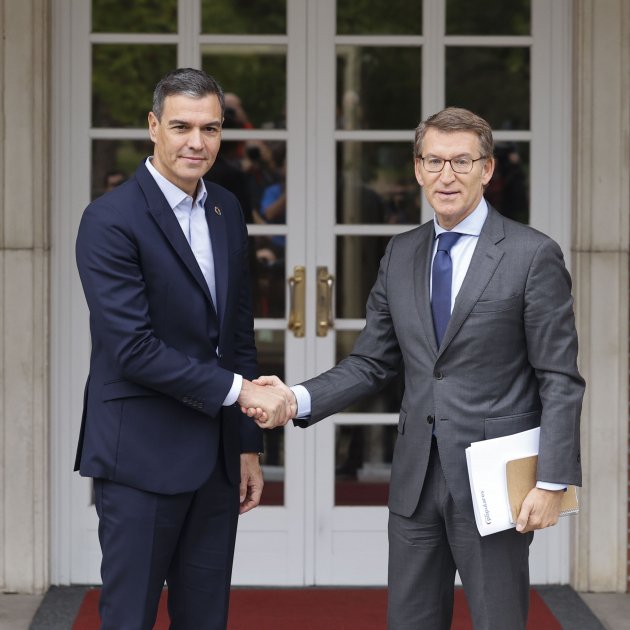It has taken the unprecedented resignation of Spain's most senior judge to stir the political leaders into action on a grave crisis, and it is still too early to know if it has had any effect beyond another photo opportunity and a few tweets. The meeting this Monday between Spanish prime minister and PSOE party head Pedro Sánchez, and the leader of the opposition People's Party, Alberto Núñes Feijóo, has ended with assertions of some progress on the deadlocked negotiation for renewal of the General Council of the Judiciary (CGPJ) and the Constitutional Court, after the resignation, in protest, of judge Carlos Lesmes, president of the Supreme Court. This resignation, as explained by minister Félix Bolaños, is an aggravation of the "deep institutional crisis" that the paralysis of the judicial institutions - which has gone on for almost four years - represents. To try to solve the deadlock, Sánchez and Feijóo agreed on "one last attempt at negotiation to find a quick solution to the blockade", as announced in a press conference. "Spain does not deserve this institutional crisis and the public want the page to be turned as soon as possible", reflected Bolaños, affirming that the fastest possible solution will be sought. However, they have not set deadlines for this agreement, but have stated that they will work "quickly and urgently", as this is a "shared will" of the parties.
After the meeting, Feijóo published a tweet explaining that the meeting served to make progress on the joint renewal of the CGPJ and also the Constitutional Court "with a new framework that deepens in criteria of [judicial] independence". However, the leader of the opposition reproached Sánchez that this important step could have been taken "much earlier", and used the opportunity to demand legal reform from the PSOE, "as requested by the European Union and as the PP has been requesting".
Long meeting
The emergency meeting between the Spanish PM, Pedro Sánchez, and the PP leader, Alberto Núnez Feijóo, started around 10:45am this Monday. Not only Sánchez and Feijóo were present, but also the minister for the PM's department, Félix Bolaños, and the institutional deputy-secretary general of the PP, Esteban González Pons. Both were interlocutors in charge of carrying out the negotiations on the renewal of the judiciary up till now, without much success.
After the announcement on Sunday that judge Carlos Lesmes had - exactly as he threatened to do weeks ago - resigned as president of the Supreme Court and also as president of the CGPJ, Sánchez and Feijóo agreed to meet to try to resolve this institutional crisis. Thus, a negotiation that was frozen last July, after a meeting between Bolaños and González Pons ended without agreement and with an exchange of heated rebukes between the two political parties, was revived. Despite a series of high-level warnings from the European Union, it was not until Lesmes announced his departure that the leaders of the two largest parties in the Spanish state agreed to resume negotiations.
Lesmes formalizes his resignation
This very Monday, Carlos Lesmes formalized his resignation as president of the CGPJ and of the Supreme Court, complying with the announcement he had made weeks ago. Thus, he has already communicated his decision to Felipe VI, expressing his "willingness to cease immediately in the functions that correspond to him legally", as reported by the judicial organ itself. In addition, he also indicated to the king that "once the termination has been agreed by His Majesty the King through a Royal Decree signed by the Spanish Prime Minister and published in the Official Gazette of the State, and in the face of the legal impossibility of proceeding with the appointment of a new president of the Supreme Court and of the CGPJ (...) the replacement mechanism for the president provided for by law will be activated." Lesmes has also communicated his resignation to the Spanish prime minister, Pedro Sánchez, via the ministry of justice, to the members of the CGPJ, to the governance chamber of the Supreme Court and to the presidents of Congress, Senate and Constitutional Court.
